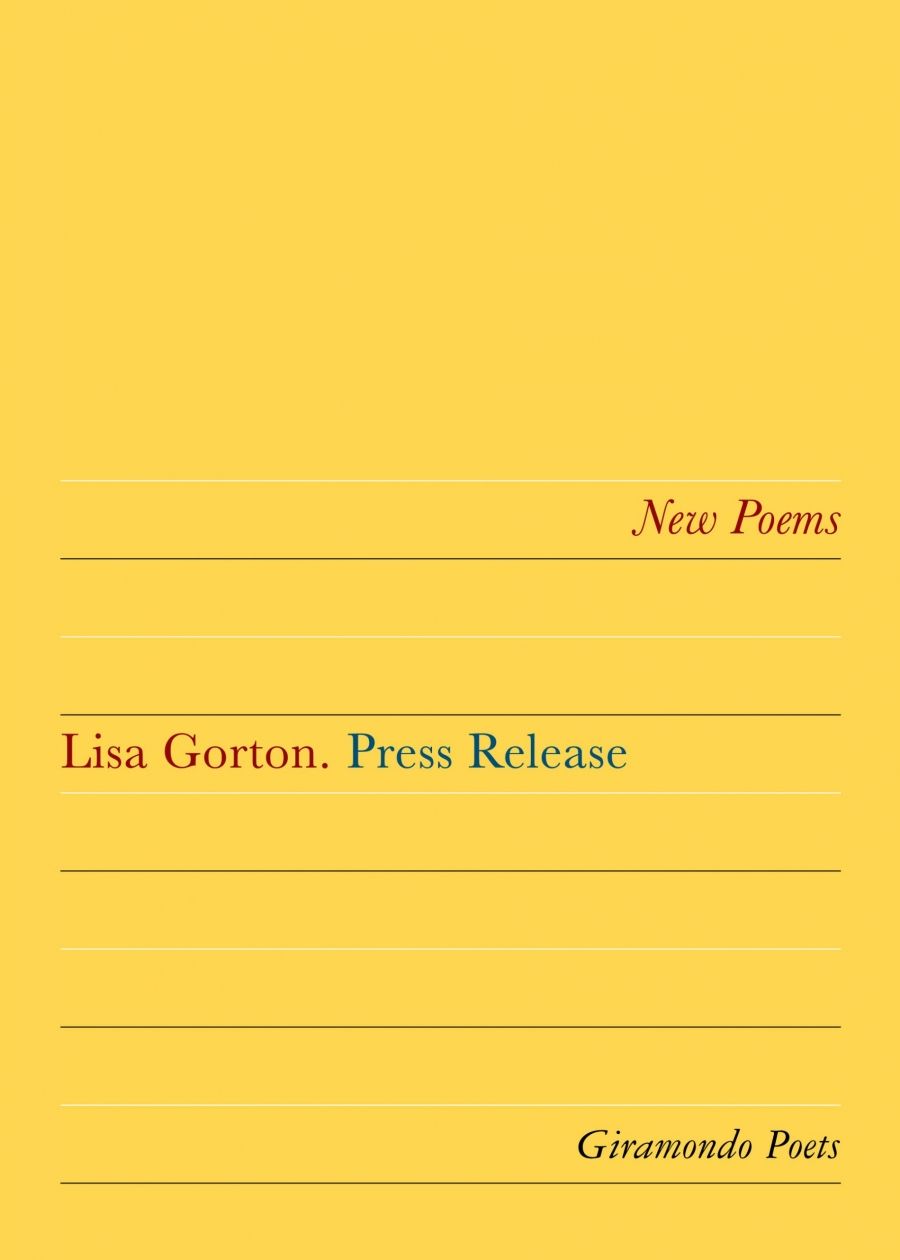
- Free Article: No
- Contents Category: Australian Poetry
- Review Article: Yes
- Online Only: No
- Custom Highlight Text:
In Lisa Gorton’s first collection of poetry, somewhat ambiguously entitled Press Release, light, absence and doubt are major preoccupations. The poems speak of ‘a weight of light’, ‘neon expectation’, ‘ruined cities overrun with light’ and ‘all that falling light’ – in just the first of this volume’s four sections. Light, for Gorton, is a sometimes mesmerising and often overwhelming force. Among other things, it is the illumination of nostalgia, the halo of memory and the shining-out of presence. Interestingly, it is also about culmination, often standing for various forms of – usually problematic – realisation and achievement. For example, in ‘Scald’, the poem’s persona speaks of ‘light drawn in to the idea of light, all-eye and all / forgetting, more entire than perfection’; and in ‘Guns I / Major Mitchell, 1836:’ wild birds ‘are tearing the blueblack / shadows out of the river’, as if light and life are joined in defying the ruination of death and the depredations of time. But in Gorton’s poetry light never fully escapes the dark, and in ‘Scald’ the ‘sheer of light’ is also a ‘shining blank’, while the poem’s speaker represents herself as a ‘bright / dark torso’, images in which absence, darkness and light are inextricably connected.
- Book 1 Title: Press Release
- Book 1 Biblio: Giramondo, $22 pb, 70 pp
Perhaps the core of this collection is the book’s final section, entitled ‘Mallee Sequence’, which powerfully registers the light and dark of the Australian outback (‘Guns I’ and ‘Scald’ are from this sequence). In these poems, Gorton explores connections between the past and present, conjuring the lives of historical figures in small dramatic monologues and short lyrics that create a strong sense of both the Mallee country and some of the people who have tried to come to terms with this country. There is a muted surrealism at work in these poems – in which paddocks ‘walk about the house’ and a bow tie is ‘like a straight-faced wink’ – and a significant part of their force comes from the convincing way in which they emphasise the isolation of individual lives and present the past as foreshadowing the present. With their images of dust and water, they also convey the sense that people are only ever provisionally settled in such a landscape.
However, there is a more relaxed and playful group of four poems at the heart of the ‘Mallee Sequence’, simply entitled ‘Childhood’. These poems refract the past and family life through a prismatic, confident language, relying as much on verbal invention and dexterity as on poetic argument. Witness, for example, the ornamented precision of the following:
Double-dink, meaning clutch and bicker,
on the pinch-withered roan, your snitch-tailed
forelock-shrugger, lank as rags, stare
coated as a rust stain ...
In such persuasive writing, Lisa Gorton demonstrates that she is cognisant of, and in some respects heir to, twentieth century poets such as Gerard Manley Hopkins, Dylan Thomas and, at least in some of his poetic incarnations, Les Murray. For such poets, the dance of language – partly intuited, partly sensuous incantation, partly a sinewy, rhythmical life – is central to their craft.
Other poems are sparer and more analytical. Many quiz the past or the future. This volume’s opening poem, ‘Graffiti’, ruminates on the fate of the citizens of Pompeii, famously consigned to ‘the dark’ by the eruption of Mount Vesuvius in 79 CE while pursuing their daily lives and preoccupations. Gorton’s poem registers that some of Pompeii’s graffiti is, unsurprisingly, about love and sex; as it does so, the reader is invited to consider the pathos of lives that ended so suddenly. At the poem’s conclusion, as ‘ashes fall softly’ in the present tense, the implication is that time and history weigh uneasily on us all; that Pompeii may be understood as a metaphor for contemporary experiences of loss and forgetting.
There is a form of time travelling, too, in the three-part sequence, ‘Scifi’ – but this time the poem projects the reader into the future. The second part of the sequence, ‘Press Release’, is a moving meditation on a mother’s quandary in relinquishing her child so that it may travel to ‘the New Life on Titan’ in an imagined 2020. The speaker reassures herself that ‘he is safe’, and the poem culminates in the tender, problematic words she records for her child to hear during his light years of travel:
‘Press release, my darling,
and do not sorrow. Do not once sorrow.
If you think of me, think only of these years
I held your unfailing present in my empty hands.’
Poignant and restrained, such lines register the speaker’s deep sense of loss and ambivalence, deftly and with no undue sentimentality.
The recurrent sense of loss in Gorton’s work is reprised differently in poems about a failing relationship in the section entitled ‘The Affair’. These are simple, eloquent poems that make a virtue of saying less rather than more. They demonstrate a contained, sometimes rueful, occasionally wry and mildly self-lacerating sense of humour, and a refined awareness of the absurdity of much of human conduct. Whether it is an overheated car engine suggesting to a poem’s speaker that ‘a whale is / caught in our engine’ or hidden cockroaches becoming ‘the small and dreamless apparatus of hunger’, these poems find a partial and wary consolation in knowing that it is not always possible to fully come to terms.
Press Release, then, is an engaging, inventive and sometimes intimate collection. As well as poems already mentioned, it contains some elegiac works, one of which – ‘Solitaire’ (first published in ABR, September 2007) – is particularly fine. Such poems, to refer back to the discussion of light that opened this review, achieve both clarity and illumination.


Comments powered by CComment